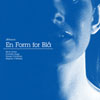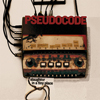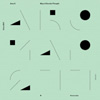 Few artists can boast debut albums as stunning as this one, making its reissue after nearly three decades of unavailability something of a major event.  Originally recorded in 1983, the Soul Possession sessions assembled a murderer's row of talented collaborators such as Crass and UK dub heavyweight Adrian Sherwood to back young Annie Anxiety's animated and unseemly tales from the dark side.  Rightfully considered an underground classic, this album captures a rare "super group" in which everyone involved was at the top of their game, giving birth to something truly disturbing and visionary.
Few artists can boast debut albums as stunning as this one, making its reissue after nearly three decades of unavailability something of a major event.  Originally recorded in 1983, the Soul Possession sessions assembled a murderer's row of talented collaborators such as Crass and UK dub heavyweight Adrian Sherwood to back young Annie Anxiety's animated and unseemly tales from the dark side.  Rightfully considered an underground classic, this album captures a rare "super group" in which everyone involved was at the top of their game, giving birth to something truly disturbing and visionary.
Two new shows just for you. We have squeezed out two extended release episodes for this weekend to get you through this week. They contain mostly new songs but there's also new issues from the vaults. The first show features music from Rider/Horse, Mint Field, Robert Aiki Aubrey Lowe, Anastasia Coope, ISAN, Stone Music, La Securite, Bark Psychosis, Jon Rose, Master Wilburn Burchette, Umberto, Wand, Tim Koh, Sun An, and Memory Drawings. The second episode has music by Laibach, Melt-Banana, Chuck Johnson, X, K. Yoshimatsu, Dorothy Carter, Pavel Milyakov, Violence Gratuite, Mark Templeton, Dummy, Endon, body / negative, Midwife, Alberto Boccardi, Divine. Cow in Maui from Veronika in Vienna. Get involved: subscribe, review, rate, share with your friends, send images! |



 This digital-only EP released as an appetizer for the latest MBM full-length is a deliciously weird mixture of the sounds and ideas that make Meat Beat records so wonderful and unpredictable.
This digital-only EP released as an appetizer for the latest MBM full-length is a deliciously weird mixture of the sounds and ideas that make Meat Beat records so wonderful and unpredictable. Much like the roster of labels like Raster-Noton or Touch, Cristal work with a type of noise that is very different to the Merzbows and Whitehouses of this world. Instead of bludgeoning the listener with volume, these guys focus on the textures of the sound and keep the dynamics intact. The music on this album is like a macro photograph of a small but intricate piece of machinery covered in dust; there is a lot of detail but on a much smaller scale.
Much like the roster of labels like Raster-Noton or Touch, Cristal work with a type of noise that is very different to the Merzbows and Whitehouses of this world. Instead of bludgeoning the listener with volume, these guys focus on the textures of the sound and keep the dynamics intact. The music on this album is like a macro photograph of a small but intricate piece of machinery covered in dust; there is a lot of detail but on a much smaller scale. Miami's Harry Pussy combined the raw, undisciplined approach of old school punk rock, the atonal harshness of noise, and the micro-track lengths of classic grindcore into a muddy mess of distortion and chaos. An early precursor to the noise/rock vibe Wolf Eyes has been pushing, HP stayed more in the realms of dirty punk rock rather than the more electronic inspired work of the Michigan Boys, with the exception of the dirty analog synth of "MS20", which apes any noise band at their own game.
Miami's Harry Pussy combined the raw, undisciplined approach of old school punk rock, the atonal harshness of noise, and the micro-track lengths of classic grindcore into a muddy mess of distortion and chaos. An early precursor to the noise/rock vibe Wolf Eyes has been pushing, HP stayed more in the realms of dirty punk rock rather than the more electronic inspired work of the Michigan Boys, with the exception of the dirty analog synth of "MS20", which apes any noise band at their own game. Richter displays a hitherto unsuspected sense of humor in composing music for ring tones. This is an intriguing concept, with an apt title and short pieces that prove surprisingly wide ranging and affecting. The only flaw is that if my phone sounded this good I would be loath to interrupt any of these tracks to answer it.
Richter displays a hitherto unsuspected sense of humor in composing music for ring tones. This is an intriguing concept, with an apt title and short pieces that prove surprisingly wide ranging and affecting. The only flaw is that if my phone sounded this good I would be loath to interrupt any of these tracks to answer it. Rather than simply drawing elements from 20th century synthesizer music, Reinhardt instead recreates it with a sense of modernity and development that is not simply a nostalgic collection of tracks, but a disc that fully reproduces the sound and sensation of the avant garde pieces, soundtracks, and pop songs that classic analog synthesizers ended up pushing their way into.
Rather than simply drawing elements from 20th century synthesizer music, Reinhardt instead recreates it with a sense of modernity and development that is not simply a nostalgic collection of tracks, but a disc that fully reproduces the sound and sensation of the avant garde pieces, soundtracks, and pop songs that classic analog synthesizers ended up pushing their way into. With mainstay Vincent De Roguin absent and Stephen O'Malley exercising sharp restraint, Æthenor have released their best album and maybe one of the best live recordings I have ever heard. Assembled from three shows recorded in Oslo, Norway during 2010, En Form For Blå captures Æthenor improvising a loose electric sound bound expertly together by the talents of percussionist Steve Noble and one-half of the Ulver crew. Together they create a surprisingly intelligible sound, which betrays its impromptu origin.
With mainstay Vincent De Roguin absent and Stephen O'Malley exercising sharp restraint, Æthenor have released their best album and maybe one of the best live recordings I have ever heard. Assembled from three shows recorded in Oslo, Norway during 2010, En Form For Blå captures Æthenor improvising a loose electric sound bound expertly together by the talents of percussionist Steve Noble and one-half of the Ulver crew. Together they create a surprisingly intelligible sound, which betrays its impromptu origin. Although they appeared on a variety of compilations in the early 1980s, including the legendary Rising from the Red Sands, Pseudocode mostly remained unknown, putting out their own cassettes and the occasional odd 7", but never reaching the same levels of notoriety that contemporaries in the early industrial underground enjoyed. Nearly 30 years later, some of these earliest recordings have been issued, for the first time, in a deluxe double LP package.
Although they appeared on a variety of compilations in the early 1980s, including the legendary Rising from the Red Sands, Pseudocode mostly remained unknown, putting out their own cassettes and the occasional odd 7", but never reaching the same levels of notoriety that contemporaries in the early industrial underground enjoyed. Nearly 30 years later, some of these earliest recordings have been issued, for the first time, in a deluxe double LP package. Recorded together using similar techniques, but vastly different source materials, these two releases feel like different parts of the same whole, with both of them emphasizing Mathieu's balancing of texture and melody, to excellent effect, through the use of processed, pre-recorded compositions.
Recorded together using similar techniques, but vastly different source materials, these two releases feel like different parts of the same whole, with both of them emphasizing Mathieu's balancing of texture and melody, to excellent effect, through the use of processed, pre-recorded compositions. I don't understand how Erik Carlson has managed to stay so woefully underappreciated and low-profile for so long, as he has a very distinctive and appealing aesthetic.  Also, he has recently been largely infallible quality-wise. That hot streak continues here: wisely sticking closely to the sound he intermittently perfected with 2009's excellent Charmed Birds Against Sorcery, Carlson has delivered yet another impressive album of spidery, shimmering beauty.  It could benefit from a bit more bite though.
I don't understand how Erik Carlson has managed to stay so woefully underappreciated and low-profile for so long, as he has a very distinctive and appealing aesthetic.  Also, he has recently been largely infallible quality-wise. That hot streak continues here: wisely sticking closely to the sound he intermittently perfected with 2009's excellent Charmed Birds Against Sorcery, Carlson has delivered yet another impressive album of spidery, shimmering beauty.  It could benefit from a bit more bite though.
